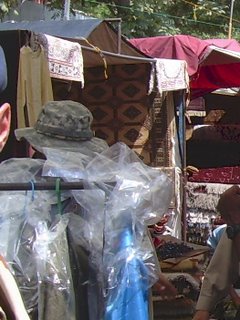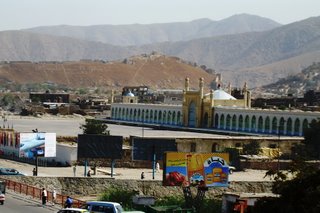
An Afternoon in Dubai
What does one do with 8 hours to kill in Dubai? Dubai is one of the world’s great shopping paradises with malls so large and opulent that one even has indoor snow skiing. I hear stories from my associates about visits to the malls during layovers and of the great spas and messages than one can get in the large hotels. Given my distaste for shopping and stiff back from flying, the choice might seem obvious. But, my trip to the bazaar in Kabul has whetted my appetite for something more in keeping with my fantasy of what a Middle Eastern market ought to look like.
My fantasy is somewhat fulfilled with the ancient souks of the old Al Ras section of Dubai, adjacent to the Dubai Creek. It did, however, have a inauspicious start. My first taxi ride from the airport was to one of the modern malls. It was truly grand (as malls go). There were all the shops that you would expect in any upscale mall in the US, with a scattering of specialty shops catering to the local need for Arab dress. Except for the sight of the occasional couple in flowing Arab garb, you could be in Passaic, NJ. I couldn’t get out fast enough.
The next taxi ride is to the Spice Souk. My Indian taxi driver (this is a city filled with guest workers) assures me that this is the “old city” that I am looking for and provides some sage haggling advice as we drive. One block off the main thoroughfare, he is proven right. Under the ancient wooden arches, that protect the streets from the blazing sun, are spice shops whose smells overwhelm the senses. I work my way down the main streets and small side alleys that house lesser shops selling “dollar store” merchandise. I buy spices after the appropriate haggling (though not as skillful as a true professional shopper). I continue on to another of the storied areas of the old city, the Gold Souk. If the Spice Souk overwhelmed the sense of smell the Gold Souk attacks the sight with windows covered floor to ceiling with bright gold chains, necklaces and bracelets. Store after store display their shiny wares for the shoppers who stroll the shaded streets. I am duly impressed by the shear scope of this display of wealth but refrain from temptation and make no attempt to press my haggling skills.
But, the souks have fueled my interest in exploring this part of the city. I continue on to the working class shopping areas that are adjacent to these famous souks, where locals purchase their day-to day needs. I also walk the length of the docks along the Dubai Creek. Here, one can observe the full spectrum of Dubai life. Ancient wooden commercial boats, some ornately decorated, load and unload their cargos of lumber, generators and auto parts. Small water taxis crisscross the creek, from designated stations, loaded with locals and adventurous tourists. Beautiful wooden tour boats offer moonlight dinner cruises and 100 foot luxury yachts are moored two-deep at the large hotels.
The water taxi ride across the river and the dinner cruise on a moonlit night are both tempting (no offers from the yachts,) but I have a rapidly approaching flight home and blisters rapidly developing on my right foot. Maybe next time.



